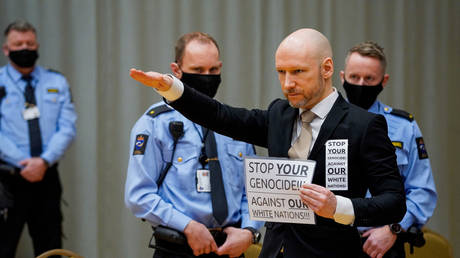
Anders Behring Breivik is serving Norway’s longest sentence, 21 years, for killing 77 people in 2011
Norwegian mass killer Anders Behring Breivik has sued the state for violating his human rights by keeping him in “extreme” isolation, his lawyer, Oeystein Storrvik, told Reuters on Friday.
“He’s suing the state because he has been in an extreme isolation for 11 years, and has no contacts with other people except his guards,” Storrvik explained.
Breivik is serving the longest sentence possible under Norwegian law – 21 years – for killing 77 people in a combination mass shooting and truck bombing in July 2011 in the worst peacetime atrocity in the country’s history. Judges have the option to extend his sentence if he is deemed to be still a threat after that period.
After serving the first nine years of his sentence in Skien prison and reportedly tiring of the monotony of his surroundings, Breivik was moved to Ringerike prison last year, where he remains under maximum security conditions – including, according to his lawyer, solitary confinement.
“We hoped that there would be better conditions and that he could meet other people,” Storrvik lamented.
An appeals court in 2017 overturned a lower court’s decision that the conditions of Breivik’s confinement in a three-room cell violated his rights. In 2016, an Oslo court had found separating him from other prisoners due to the threat he allegedly posed amounted to “inhuman or degrading treatment or punishment.”
The state maintained at the time that Breivik “still wants to inspire others” and thus must be kept from other prisoners and the outside world. However, his living conditions are comparatively cushy compared to the US, where solitary cells are less than a quarter the size of his own three-cell suite.
The convicted terrorist is permitted to play video games, use the computer (without internet), work out with gym equipment, and read books and newspapers, as well as to study toward a degree in political science. He is even allowed to send and receive letters, though many of these end up censored if prison staff feel they could incite hate crimes.
While Breivik applied for parole last year, his application was rejected when the court found he still posed a threat to society. The judge ruling he lacked empathy and compassion for his victims and had not changed since committing the shocking murders after he attempted to defend his actions in gunning down dozens of mostly-teenage victims at a Labour Party youth camp on the island of Utoya, claiming most of those affected were not children but people in “leadership positions.”
Breivik’s latest lawsuit is expected to be heard in Oslo district court next spring, his lawyer said.




